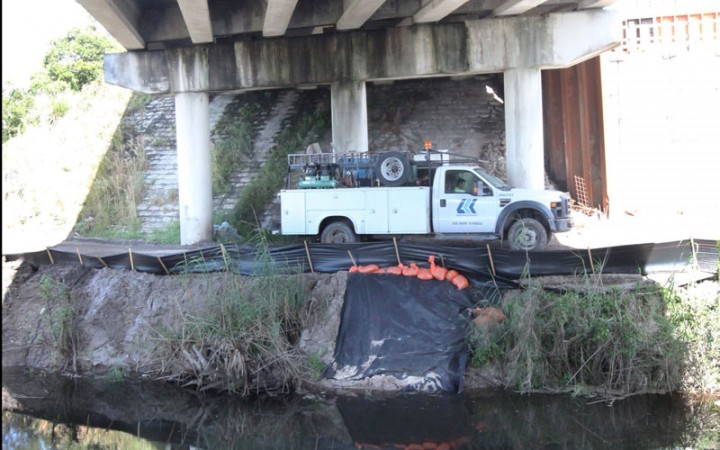
INDIAN RIVER COUNTY — Lawyers argued in court here last week whether a new Interstate 95 bridge has so compromised the banks of a canal near the Vero Beach State Road 60 exit that massive flooding could result.
More specifically: Has a Florida Department of Transportation decision to sink bridge pilings into the banks of a drainage canal without stabilizing the banks violated the law?
The local water control district says it has and the omission could be a danger to the public.
“Bridge-building must be approved by the (water control) district engineer, but it was not,” Michael O’Haire, an attorney who represents the Indian River Farms Water Control District, told the court.
“We believe we don’t need permission to construct a bridge,” Department of Transportation attorney Jason Watts said.
“Or to do anything else,” shot back O’Haire, who argued DOT is playing fast and loose with public safety because it didn’t adhere to water control district requirements to strengthen canal banks before sinking the huge pilings.
Without heavy rock to reinforce the canal walls, a storm might cause the banks to crumble, creating a bottleneck and water backup, which could mean 55,000 acres of homes, farms and retail shops would become a swamp, said David Gunter, superintendent for water control.
To that end, Gunter told the court, DOT needs to get back in there near SR60 and I-95 and pile a very heavy rock like granite along the canal banks, as well as some concrete lacing to “armor the banks.”
“Were those banks armored before we started construction?” DOT’s Watts challenged.
“No,” said Gunter, explaining that it wasn’t a crucial situation before the pilings were put in. “Now, the banks will slide in with high flow. You can see the erosion, already.”
Watts asked if the banks could be armored, after the fact, when the bridge is finished.
“It’s possible,” said Gunter, “but I wouldn’t choose to do it on my dime.”
Which raised another issue: Will the local water control district get stuck paying to stabilize the canal walls when the construction is completed and DOT leaves?
A possible answer came during a short recess when Watts and O’Haire talked outside the courtroom.
Watts suggested that DOT might be willing to armor the banks and that he and O’Haire could work something out in mediation, outside the courtroom.
O’ Haire listened, but back in court after the recess, he didn’t appear conciliatory.
He asked the civil engineer for the water control district: “Was the omission of armoring a cost-saving move that resulted in the lowest bid?”
In other words: Did a DOT subcontractor forsake safety for price-cutting to land the job?
“Yes,” said water control civil engineer George Simons.
Watts told the judge that no irreparable harm had been done.
“It will be irreparable harm to my budget if we have to fix it,” said Gunter. “Once a dollar is spent we can’t unspend it.”
Watts suggested to Judge Cynthia Cox that the two sides leave the courtroom and get a mediator to work it out.
Cox set a date later this month for mediation.
She also set a date in court the day after, in case the mediation goes nowhere.



